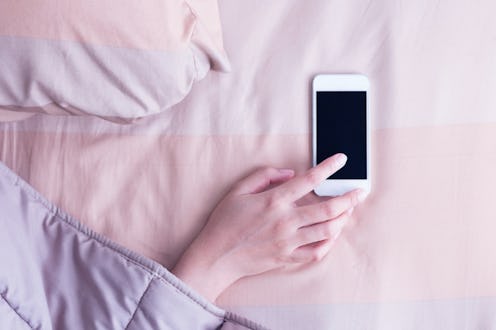Life
Your High Speed Internet Is Messing With Your Sleep, A New Study Says

There’s no doubt that high-speed internet is a wonderful thing, but we're still understanding how exactly it's changing our behavior — and possibly our health. When it comes to long-term health outcomes, sleep deprivation ranks as one of the most serious precursors to chronic illnesses, mood disorders, and cognitive problems, and it’s an all-too-common problem. And according to new research, high-speed internet can affect your sleep in a serious way. Even though your latest social media updates and push notifications provide an ever-tempting array of digital distraction and entertainment, it’s important to know when to put the phone down for the sake of getting some shut eye.
Per the new study published in the Journal of Economic Behavior and Organization, researchers are concerned that using digital devices and computers with high-speed internet before bed may disrupt our precious sleep patterns — and the effects of too little rest on our moods and cognitive performance the following day can be pretty severe. It's important to note while we've known for a while that screen time takes a toll on our circadian rhythms and our sleep, this study specifically looked at how internet access makes it harder to get your seven to nine hours.
ScienceAlert reports that in order to better understand the relationship between sleep deprivation and internet use, researchers examined national surveys on sleep, how people reported using computers and devices before bed, and broadband data reports. Researchers found that those with high-speed internet access sleep about 25 minutes less than those without it, are way less likely to sleep the recommended seven to nine hours per night, and report less satisfaction with their sleep quality overall. According to Motherboard, this is the first study to causally link sleep deprivation with high-speed internet access, meaning that they could prove internet access has an effect on sleep.
The researchers noted that “high-speed internet promotes excessive electronic media use” — and that the temptation of checking our email or refreshing Instagram just one more time before bed is costing us major sleep quality. Researchers further observed that “high-speed internet use makes it very enticing to stay up later to play video games, surf the web,” and spend copious amounts of time on social media. The researchers hope that by shedding light on this growing public health issue, we can all bring a bit more mindfulness to our tech use before turning in for the night.
“Given the growing awareness of the importance of sleep quantity and quality for our health and productivity, providing more information on the risks associated with technology use in the evening may promote healthier sleep and have non-negligible effects on individual welfare and well-being,” the researchers further noted.
So, if the lure of your phone is too much to resist as bedtime approaches, maybe start a new pre-slumber routine. For the sake of your sleep, try turning off your WiFi or your phone's data before you get into bed. Even if you can't resist reading an ebook before turning in (with night mode on, of course), the lack of internet may help you be more mindful about when to power down. Or for bonus points, listen to some music, read a book, or try a bit of meditation to get a break from the blue light, and set yourself up for a great night’s rest.